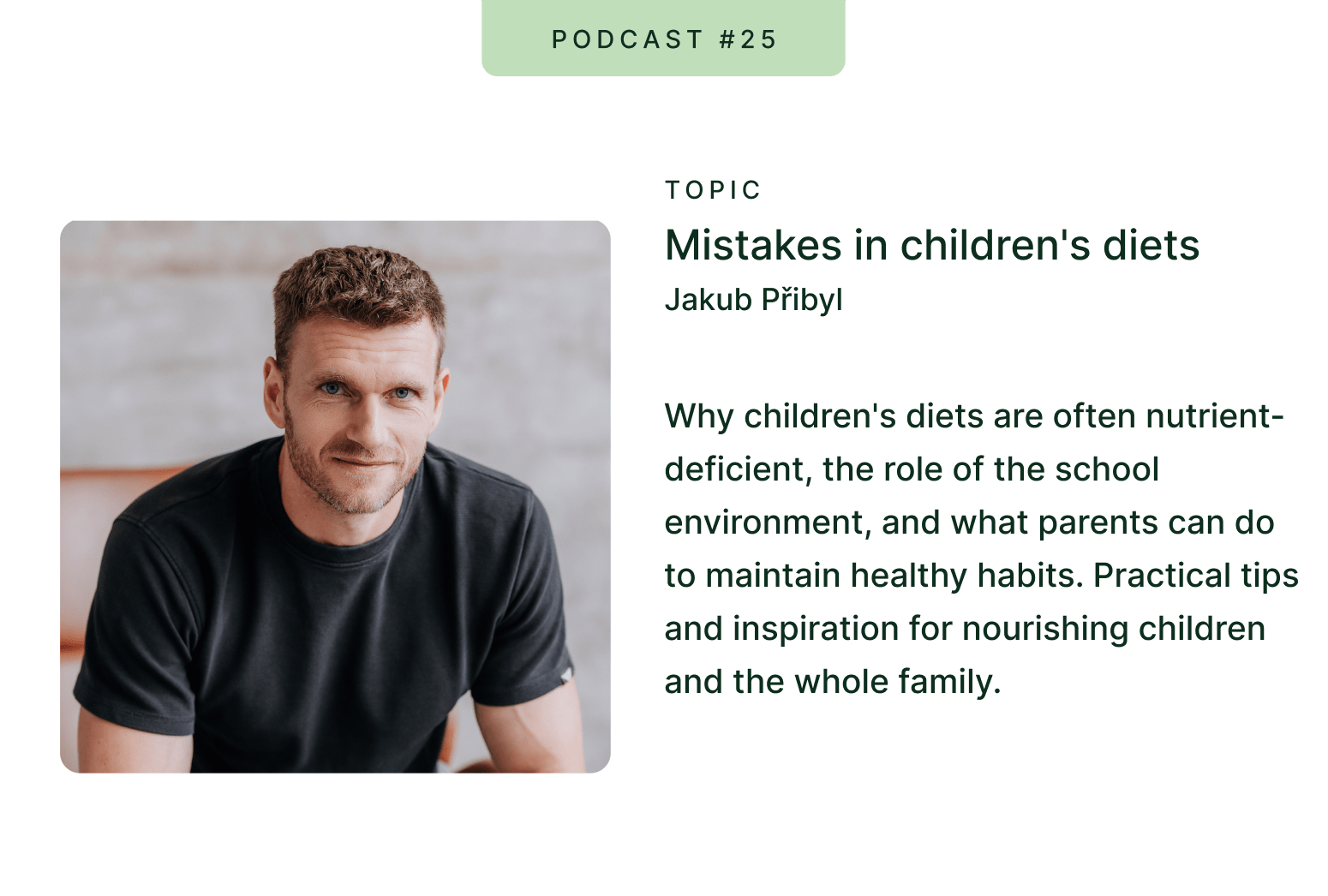Ewa: Cześć i witajcie w kolejnym odcinku podcastu Trime. Dzisiaj skupiamy się na żywieniu i suplementacji dzieci. Jesteśmy tu z naszym wewnętrznym zespołem Trime — Jakubem Přibyl, którego możecie znać z poprzednich odcinków. Cześć, Jakub.
Jakub: Cześć i witam wszystkich naszych słuchaczy.
Eva: Jakub jest twórcą receptur Trime i specjalistą ds. żywienia. Nazywam się Eva Potužníková, a dołączy do mnie Renata Novotná. Cześć, Renata.
Renata: Cześć wszystkim.
Ewa: Razem z Renatą zajmujemy się obsługą klienta, odpowiadając na różnorodne pytania – dotyczące suplementów, odżywiania i nie tylko. Zawsze staramy się udzielać kompleksowych odpowiedzi, uwzględniając wiedzę z zakresu naturopatii, która wciąż nie jest tu powszechnie znana.
Renata: Tak, Eva i ja studiujemy naturopatię kliniczną w Pradze i obecnie kończymy studia. Naturopatia to holistyczne podejście, które łączy nowoczesną medycynę i naukę z tradycyjnymi terapiami naturalnymi – takimi jak ziołolecznictwo i narzędzia diagnostyczne, takie jak analiza języka, paznokci i tęczówki oka. Koncentruje się na pierwotnych przyczynach problemów zdrowotnych, a nie tylko na objawach, i wspiera naturalną równowagę organizmu. Obie jesteśmy też mamami – Eva ma czteroletniego syna, a ja siedmioletniego syna i dwuletnią córkę. Zdrowie dzieci to więc coś, czym żyjemy każdego dnia.
Ewa: Jakub, pracowałeś z tak wieloma dziećmi w swojej praktyce. Jakie są najczęstsze powody, dla których rodzice zgłaszają się do Ciebie? Czy to otyłość, zaburzenia odżywiania?
Jakub: To bardzo zróżnicowane. Otyłość staje się coraz częstszym problemem, ale ponieważ jestem znany z żywienia sportowców, często spotykam się z rodzicami młodych sportowców. Pracowałem również z żywieniem niemowląt i małych dzieci. Widziałem więc całe spektrum. I wspaniale, że oboje tu jesteście – wnosicie zarówno teorię, jak i praktyczne doświadczenie rodzicielskie. Myślę, że razem możemy zgłębić ten temat w naprawdę wartościowy sposób.
Ewa: Czy na podstawie swoich doświadczeń dostrzegasz jakieś trendy lub powszechne niedobory w diecie dzieci?
Jakub: Tak, zdecydowanie. Najczęstsze problemy są dość podobne do tych, które obserwujemy u dorosłych – za dużo cukru i rafinowanych węglowodanów, a za mało prawdziwego, pożywnego jedzenia. Jeśli rodzice nie dają dzieciom zdrowych nawyków, trudno im je wykształcić. A wspólne posiłki w szkołach często pogarszają sytuację.
Renata: Czy widzisz też więcej alergii pokarmowych lub nietolerancji, np. glutenu, mleka, jaj?
Jakub: Zdecydowanie. Kluczowym czynnikiem jest to, czy dziecko było karmione wyłącznie piersią. Dzieci karmione piersią mają bardziej zróżnicowany mikrobiom jelitowy, co zmniejsza ryzyko otyłości i alergii. Statystyki pokazują, że niemowlęta karmione wyłącznie piersią przez sześć miesięcy mają o 23% mniejsze ryzyko rozwoju nadwagi. Wiele rzeczy może jednak pójść nie tak podczas wprowadzania pokarmów stałych – zły czas lub wybór odpowiedniego jedzenia może nasilać zaburzenia odżywiania i selektywne odżywianie. Dzieci naturalnie preferują słodkie i miękkie pokarmy, więc mogą później odrzucać warzywa i produkty pełnoziarniste. Kiedyś obserwowaliśmy to głównie u dzieci z autyzmem, ale teraz staje się to coraz powszechniejsze.
Ewa: Dlatego bardzo ważne jest, w jaki sposób wprowadzamy produkty spożywcze i jak kształtujemy nawyki żywieniowe w domu.
Jakub: Dokładnie. Jeśli posiłki są pośpieszne lub nacechowane emocjonalnie, dzieci wyrabiają sobie negatywne skojarzenia. Rodzice często sami nie jedzą dobrze lub nie mają czasu, więc nic dziwnego, że dzieci też mają z tym problem.
Renata: A czy odżywianie matki w czasie ciąży ma znaczenie?
Jakub: Zdecydowanie. Jeśli przygotowania są słabe, trudno jest wszystko naprawić po porodzie, bo wszystko dzieje się szybko. Wiele mam przychodzi do mnie spanikowanych, niepewnych, jak wprowadzać pokarmy stałe. Jest zbyt wiele sprzecznych informacji.
Ewa: Obserwujemy również więcej problemów rozwojowych — autyzm, nietolerancje pokarmowe, ADHD...
Jakub: Tak, a dieta odgrywa rolę. Naturalna, pełnowartościowa żywność może pomóc złagodzić niektóre z tych zagrożeń. Cukier i dodatki wpływają nie tylko na zachowanie, ale także na jelita i układ nerwowy.
Ewa: Co sądzisz o podjadaniu i częstotliwości posiłków?
Jakub: Skup się na ustrukturyzowanych posiłkach głównych – śniadaniu, obiedzie i kolacji. Jeśli są one solidne, przekąski nie stanowią problemu. Problemem jest ciągłe podjadanie. Wiele dzieci jest pełnych soków i przekąsek przez cały dzień, więc nigdy nie odczuwają głodu na prawdziwe jedzenie.
Renata: A co ze szkołami i przedszkolami? Tu się robi trudno.
Jakub: To duże wyzwanie. Często szkolne posiłki nie są najlepsze. Niektóre dzieci są nawet nagradzane słodyczami. To uczy je, że jedzenie jest nagrodą, co może prowadzić do emocjonalnego objadania się w wieku dorosłym. Programy takie jak „Skutečně zdravá škola” próbują to zmienić. Zaangażowanie dzieci w przygotowywanie posiłków ma ogromne znaczenie.
Ewa: Co zatem powinniśmy podawać dziecku?
Jakub: Wysokiej jakości białko, zdrowe tłuszcze, węglowodany złożone, błonnik. Wiele dzieci cierpi na zaparcia z powodu niedoboru błonnika. To wpływa na apetyt i wchłanianie składników odżywczych.
Renata: A ile mięsa wystarczy?
Jakub: Około sześciu porcji tygodniowo. Mięso dziennie nie jest konieczne. Jeśli dziecko odmawia jedzenia mięsa, nie panikuj – po prostu zadbaj o zbilansowaną dietę.
Ewa: A co z tłuszczami?
Jakub: Używaj oliwy z oliwek, oleju kokosowego i ghee. Unikaj olejów rafinowanych. Wysokie spożycie kwasów omega-6 z olejów przetworzonych jest problematyczne i nie da się go rozwiązać, dodając jedynie suplementy omega-3. Chodzi o ogólną równowagę diety.
Renata: A co z suplementami – czy dzieci powinny je brać?
Jakub: Niektóre składniki odżywcze trudno dziś pozyskać z pożywienia – takie jak witamina D, kwasy omega-3 i K2. W przypadku podejrzenia niedoboru suplementacja może pomóc. Powinna być przemyślana i nadzorowana – a nie nachalna.
Ewa: A co z „egzotycznymi” produktami, takimi jak awokado czy olej kokosowy?
Jakub: Z umiarem są w porządku. Są pożywne, ale mniej zrównoważone. Tylko uważaj na ilości. Globalny rynek żywności utrudnia lokalne jedzenie, ale nie powinniśmy się ich bać – po prostu dbajmy o różnorodność.
Renata: I te wczesne nawyki utrzymują się w dorosłym życiu, prawda?
Jakub: Tak. Nawyki z dzieciństwa kształtują nasze dorosłe zdrowie. Odżywianie wpływa nawet na ekspresję genów. Możemy zapobiegać wielu problemom zdrowotnym, budując silne podstawy już na wczesnym etapie.
Ewa: Dziękuję za wysłuchanie. Jeśli masz pytania lub pomysły, śmiało się z nami skontaktuj.
Jakub: Ten podcast ma charakter wyłącznie informacyjny i nie zastępuje porady lekarskiej. Dziękuję za uwagę i pozdrawiam.

















